英语介词用法归类(配练习)
初中英语介词专项讲解及练习(包含答案)
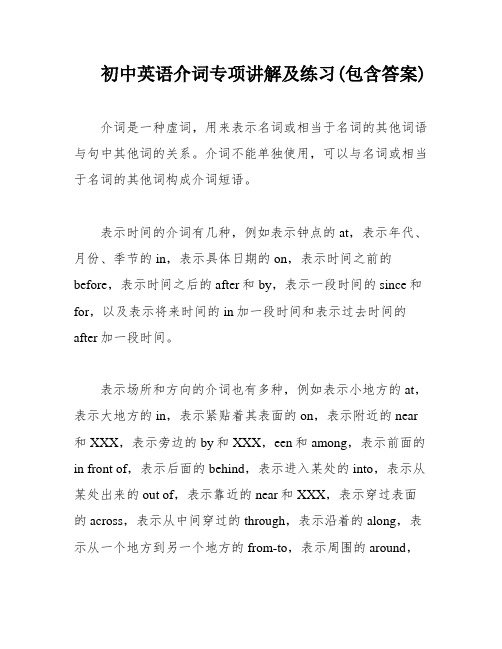
初中英语介词专项讲解及练习(包含答案)介词是一种虚词,用来表示名词或相当于名词的其他词语与句中其他词的关系。
介词不能单独使用,可以与名词或相当于名词的其他词构成介词短语。
表示时间的介词有几种,例如表示钟点的at,表示年代、月份、季节的in,表示具体日期的on,表示时间之前的before,表示时间之后的after和by,表示一段时间的since和for,以及表示将来时间的in加一段时间和表示过去时间的after加一段时间。
表示场所和方向的介词也有多种,例如表示小地方的at,表示大地方的in,表示紧贴着其表面的on,表示附近的near和XXX,表示旁边的by和XXX,een和among,表示前面的in front of,表示后面的behind,表示进入某处的into,表示从某处出来的out of,表示靠近的near和XXX,表示穿过表面的across,表示从中间穿过的through,表示沿着的along,表示从一个地方到另一个地方的from-to,表示周围的around,表示正上方的over,表示正下方的under,表示斜上方的above,表示斜下方的below。
介词的使用需要根据具体情况来判断,掌握介词的用法可以帮助我们更准确地表达自己的意思。
In using a language。
it'XXX to know about the culture and customs of the people you are XXX my experience。
as someone who has lived in different countries。
it's important to adapt and be respectful。
just like you would in your own country.With the right clothing and knowledge。
you can XXX。
小升初英语介词in、on、under、near的用法区别练习题40题(带答案)

小升初英语介词in、on、under、near的用法区别练习题40题(带答案)1. There is a book ____ the desk.A. inB. onC. underD. near答案:B。
解析:“on”表示在物体的表面上,书在桌子上,是在桌子表面这个位置,所以用“on”。
“in”表示在物体内部,书不在桌子内部,所以A错误。
“under”表示在物体下方,书不是在桌子下方,C 错误。
“near”表示在物体附近,强调距离近但不在表面上,D错误。
2. The cat is hiding ____ the bed.A. inB. onC. underD. near答案:C。
解析:猫躲在床下面,“under”表示在物体的下方,符合语境。
“in”表示在物体内部,床下面不是内部,A错误。
“on”表示在表面,猫不在床表面,B错误。
“near”表示在附近,这里强调在床的正下方,D错误。
3. There are some flowers ____ the garden.A. inB. onC. underD. near答案:A。
解析:在花园里有一些花,“in”用于表示在一个封闭空间内部,花园是一个空间,花在花园里面,所以用“in”。
“on”表示在表面,不符合,B错误。
“under”表示在下方,C错误。
“near”表示在附近,D错误。
4. My schoolbag is ____ the chair.A. inB. onC. underD. near答案:D。
解析:我的书包在椅子附近,“near”表示靠近、在附近的意思。
“in”表示在内部,书包不在椅子内部,A错误。
“on”表示在表面,这里不是在椅子表面,B错误。
“under”表示在下方,C错误。
5. There is a lamp ____ the table.A. inB. onC. underD. near答案:B。
解析:灯在桌子上,在桌子表面,用“on”。
(完整版)初中英语介词用法详解与练习
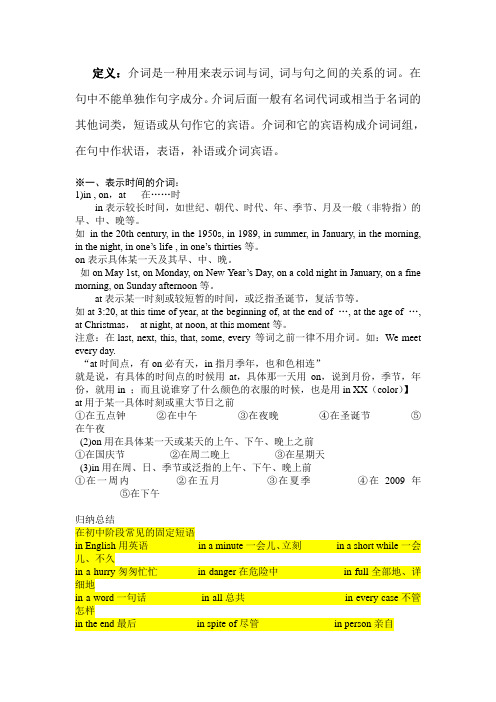
定义:介词是一种用来表示词与词, 词与句之间的关系的词。
在句中不能单独作句字成分。
介词后面一般有名词代词或相当于名词的其他词类,短语或从句作它的宾语。
介词和它的宾语构成介词词组,在句中作状语,表语,补语或介词宾语。
※一、表示时间的介词:1)in , on,at 在……时in表示较长时间,如世纪、朝代、时代、年、季节、月及一般(非特指)的早、中、晚等。
如in the 20th century, in the 1950s, in 1989, in summer, in January, in the morning, in the night, in one’s life , in one’s thirties等。
on表示具体某一天及其早、中、晚。
如on May 1st, on Monday, on New Year’s Day, on a cold night in January, on a fine morning, on Sunday afternoon等。
at表示某一时刻或较短暂的时间,或泛指圣诞节,复活节等。
如at 3:20, at this time of year, at the beginning of, at the end of …, at the age of …, at Christmas,at night, at noon, at this moment等。
注意:在last, next, this, that, some, every 等词之前一律不用介词。
如:We meet every day.“at时间点,有on必有天,in指月季年,也和色相连”就是说,有具体的时间点的时候用at,具体那一天用on,说到月份,季节,年份,就用in ;而且说谁穿了什么颜色的衣服的时候,也是用in XX(color)】at用于某一具体时刻或重大节日之前①在五点钟______②在中午________③在夜晚________④在圣诞节________⑤在午夜_________(2)on用在具体某一天或某天的上午、下午、晚上之前①在国庆节_________②在周二晚上_________③在星期天_________(3)in用在周、日、季节或泛指的上午、下午、晚上前①在一周内_________②在五月_________③在夏季_________④在2009年_________⑤在下午_________归纳总结在初中阶段常见的固定短语in English用英语in a minute一会儿、立刻in a short while一会儿、不久in a hurry匆匆忙忙in danger在危险中in full全部地、详细地in a word一句话in all总共in every case不管怎样in the end最后in spite of尽管in person亲自in fact事实上in good health身体健康的in front of在……前面in some ways在某些方面in common共同的in public当众☆考题再现:---Who was the first man with A(h1n1) flu in mainland China know for sure?---________May 11,2009.A InB OnC ForD Since2、before、afterbefore表示“在某时刻或某件事之前”,after用在时刻或某件事之后。
中考常考的英语介词归类和练习

中考常考的英语介词归类和练习中考常考介词表示地点、方位的介词常用的有:in, at, on, to, across, through, around, before, in front of, between, among, behind, beside, near, under, above, below, next to, over 等。
1) at ,in,at (1)表示在小地方; (2)表示“在……附近,旁边”in (1)表示在大地方; (2)表示“在…范围之内”。
He arrived at the station at ten.他十点钟到达车站。
He arrived in Shanghai yesterday.他昨天到达上海。
2) above, below, over, under, onabove 指在……上方,不强调是否垂直,与 below相对;over指垂直的上方,与under相对,但over与物体有一定的空间,不直接接触。
on表示在某个物体的表面上,两者是接触的。
The kite is flying above my head.风筝在我的上空飞翔。
There is a bridge over the river.河面上有一座桥。
I put my books on my desk.我把书放桌上。
There is a cat under the table.一只猫在桌子底下。
Please write your name below the line. 请在此行下方写下你的名字。
3) in front of, in the front of在……前面in front of=before意思是“在……前面”,指甲物在乙物之前,两者互不包括;其反义词是behind(在……的后面)。
in the front of 意思是“在…..的前部”,即甲物在乙物的内部.反义词是at theback of…(在……范围内的后部)。
介词in,on,at及其练习附答案(解析版)

介词in,on,at及其练习附答案(解析版)介词in、on和at在表示时间的名词前的使用有所不同。
具体区别如下:一、使用in的情况:1.表示“在某年/月/季节”时,需要使用介词in。
例如:她于1980年来到这个城市。
夏天这里经常下雨。
2.表示“从现在起一段时间以后”时,需要使用介词in。
例如:他们将在一周后去看望你。
我将在一个月后回来。
3.表示“在某个世纪”时,需要使用介词in。
例如:这台机器是在18世纪发明的。
20世纪发生了巨大变化。
4.表示“在某个年代或特定世纪某个年代”时,需要使用介词in。
例如:该事件发生在20世纪70年代。
抗日战争爆发于20世纪30年代。
5.除此之外,morning、evening和afternoon三个词也常与介词in连用。
例如:晚上看电视不要太多。
他们有时在下午做游戏。
二、使用on的情况:1.表示“在具体的某一天”或“(在具体的某一天的)早上、中午、晚上”等,需要使用介词on。
例如:杰克生于1982年5月10日。
他们是在一个雨天的早上离开的。
他于一个夏天的下午返回了美国。
2) 表示星期几或其时间,需使用介词on。
例如:我们星期六和星期天不上学。
平日你几点起床?我是在星期六的早晨听到这个故事的。
3) 表示某个节日,需使用介词on。
例如:我们通常在中秋节吃月饼。
胡老师在教师节那天收到了一张卡片。
1) 表示具体时间点,需使用介词at。
例如:他每天六点起床。
昨天下午五点半我到家了。
2) 表示特定的时节或时机,需使用介词at。
例如:他们那时很幸福。
我认为商店在白天的这个时候关门了。
3) 表示中午、夜晚或周末,需使用介词at。
例如:你中午经常做些什么?夜晚你能看到天空中有许多星星。
4) 表示某个年龄,需使用介词at。
例如:这个男孩在九岁的时候就游泳游得很好了。
When I was twenty years old。
I started teaching English at a school。
英语介词用法详解(附练习)
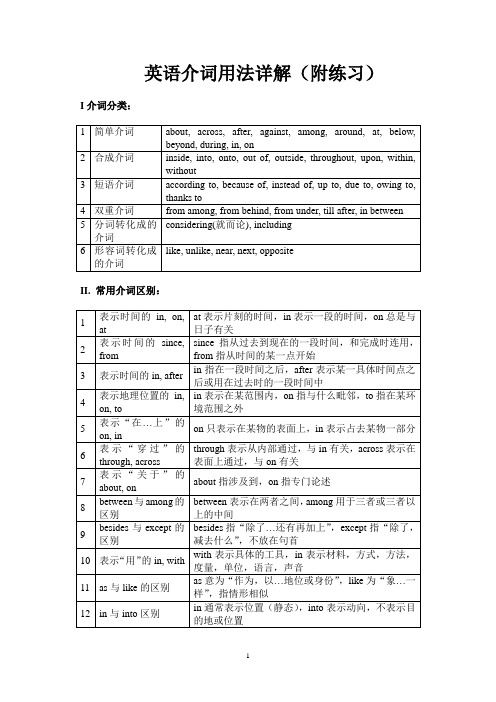
英语介词用法详解(附练习)I介词分类:II. 常用介词区别:介词的句法功能:介词不能独立在句中做成份,介词后必须与名词、代词、或动名词构成介词短语在句中充当一个成份,表示人、物、事件等与其它人、物、事件等之间的关系。
1、作定语:The book on the table is mine.2、作状语:We have breakfast at seven.(表时间);They were late for meeting because of the heavy rain.(表原因);They started the machine by pressing the button.(表方法)3、作表语:My dictionary is in the bag.4、作宾语补足语:I found him in the office.(二)主要介词区别1、表示时间的at, in, on:at表示片刻的时间,如:at 8 o’clock ,常用词组有:at noon, at night, at midnight, at the end of, at that time, at the beginning of, at the age of, at Christmas, at New Year等。
in表示一段的时间,如:in the morning, in the afternoon, in the evening, in October, in 1998, in summer, in the past, in the future等。
on总是跟日子有关,on Monday, on Christmas morning, on the following, on May Day, on a warm morning等。
2、表示时间的since和from:since表示从过去到现在的一段时间的过程,常与现在完成时连用。
(英语)英语介词的技巧及练习题及练习题(含答案)含解析
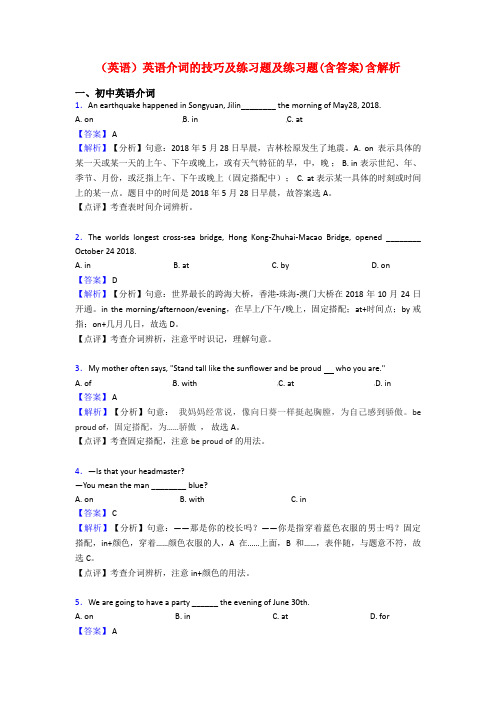
(英语)英语介词的技巧及练习题及练习题(含答案)含解析一、初中英语介词1.An earthquake happened in Songyuan, Jilin________ the morning of May28, 2018. A. on B. in C. at【答案】 A【解析】【分析】句意:2018年5月28日早晨,吉林松原发生了地震。
A. on 表示具体的某一天或某一天的上午、下午或晚上,或有天气特征的早,中,晚; B. in表示世纪、年、季节、月份,或泛指上午、下午或晚上(固定搭配中);C. at表示某一具体的时刻或时间上的某一点。
题目中的时间是2018年5月28日早晨,故答案选A。
【点评】考查表时间介词辨析。
2.The worlds longest cross-sea bridge, Hong Kong-Zhuhai-Macao Bridge, opened ________ October 24 2018.A. inB. atC. byD. on【答案】 D【解析】【分析】句意:世界最长的跨海大桥,香港-珠海-澳门大桥在2018年10月24日开通。
in the morning/afternoon/evening,在早上/下午/晚上,固定搭配;at+时间点;by戒指;on+几月几日,故选D。
【点评】考查介词辨析,注意平时识记,理解句意。
3.My mother often says, "Stand tall like the sunflower and be proud who you are." A. of B. with C. at D. in【答案】 A【解析】【分析】句意:我妈妈经常说,像向日葵一样挺起胸膛,为自己感到骄傲。
be proud of,固定搭配,为……骄傲,故选A。
【点评】考查固定搭配,注意be proud of的用法。
4.—Is that your headmaster?—You mean the man ________ blue?A. onB. withC. in【答案】 C【解析】【分析】句意:——那是你的校长吗?——你是指穿着蓝色衣服的男士吗?固定搭配,in+颜色,穿着……颜色衣服的人,A 在……上面,B 和……,表伴随,与题意不符,故选C。
(完整版)初中英语语法介词用法讲解与练习
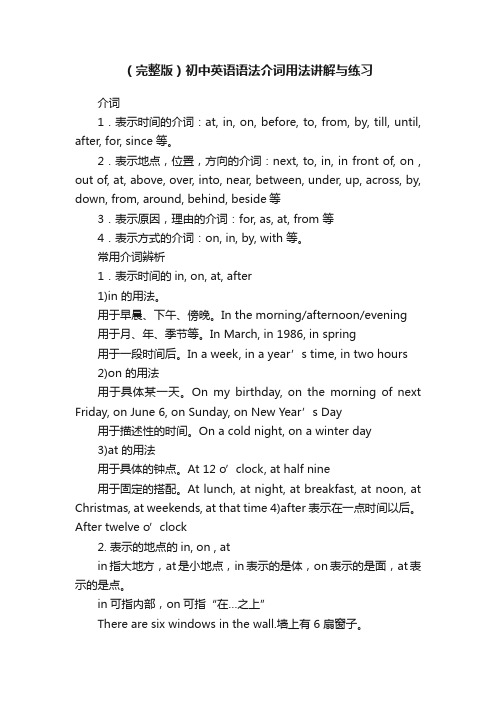
(完整版)初中英语语法介词用法讲解与练习介词1.表示时间的介词:at, in, on, before, to, from, by, till, until, after, for, since 等。
2.表示地点,位置,方向的介词:next, to, in, in front of, on , out of, at, above, over, into, near, between, under, up, across, by, down, from, around, behind, beside等3.表示原因,理由的介词:for, as, at, from 等4.表示方式的介词:on, in, by, with 等。
常用介词辨析1.表示时间的in, on, at, after1)in 的用法。
用于早晨、下午、傍晚。
In the morning/afternoon/evening用于月、年、季节等。
In March, in 1986, in spring用于一段时间后。
In a week, in a year’s time, in two hours2)on 的用法用于具体某一天。
On my birthday, on the morning of next Friday, on June 6, on Sunday, on New Year’s Day用于描述性的时间。
On a cold night, on a winter day3)at 的用法用于具体的钟点。
At 12 o’clock, at half nine用于固定的搭配。
At lunch, at night, at breakfast, at noon, at Christmas, at weekends, at that time 4)after 表示在一点时间以后。
After twelve o’clock2. 表示的地点的in, on , atin指大地方,at是小地点,in表示的是体,on表示的是面,at表示的是点。
小学英语常用介词用法详解及练习

小学英语常用介词用法详解及练习介词在句子中表示名词或代词等与其他词之间的关系。
不能单独作句子成分,常位于名词或代词(或与之相当的他词类、短语、从句)前面构成介词短语。
介词后面的成分作介词的宾语。
介词,是表示两词之间的关系的词。
我们在小学英语中学习的英语介词有:一、时间介词• 1.on( 1 ) 在------上面 The book is on the desk.( 2 ) 在------(哪一天/星期)What do you do on Wednesday?( 3 ) 在------(月、日)My birthday is on August 2nd.• 2.in(1)在------里面 The pens are in the pencil-box.(2)在------(哪一年/月)His birthday is in October. He wor ked here in 1992.(3)在------(地方) He works in Dongguan.•(4)在------之内 What are you going to do in 20 years?•(5)在------(早上、下午、晚上)I do morning exercises in the morning every day.I usually play basketball in the afternoon.I often do my homework in the evening.• 3.at(1)在------(点钟)I usually go to school at 8:00 am.(2)在中午 at noon二、方位介词• 1. under 在------底下 There is a ball under the bed.• 2. near 在------附近 There is a book shop near ourschool.• 3. in front of在------前面A boy is standing in front of the house.• 4. beside 在------旁边 A football is beside thedoor.• 5. next to 紧挨着 There is a bus station next to No. 13 Middle School.• 6. over 在------正上方 A bridge is over the river.•7. on the left在------左边 The bookstore is on the left.•8. on the right在------右边The hospital is on the right.•9. before在……之前 Mike sits before me.•10. after在------以后 He went home after school.•11. in the middle在------中间The road is in the middle.•12. at(1)在------(小地方) I am at school today.I was at home yesterday.(2)看一看 Look at the blackboard.•13. behind 在------后面There is a broom behind the door.。
初三英语介词试题训练归类(带答案)

以下是为⼤家整理的关于初三英语介词试题训练归类(带答案)的⽂章,供⼤家学习参考!【2012福建福州】33. Bill has made great progress _____________the help of his teachers.A. forB. withC. under【答案】B【解析】选B。
考查介词短语的⽤法。
with help of sb. 意为“在......的帮助下”。
此处句意为:在⽼师的帮助下⽐尔取得了巨⼤的进步。
故选B。
【2012贵州毕节】23. Her mother goes to work ______ bus every morning.A. byB. atC. onD. in【答案】A考查介词的⽤法。
句意为“她妈妈每天早晨坐公共汽车去上班”,by bus为固定搭配,意思是“乘坐公共汽车”。
【2012贵州贵阳】32. Linda is not good at Chinese, but she passed the exam ______ the help of her classmates.A. withB. underC. without【答案】A考查介词的⽤法。
with意为“和⼀起,在某⼈的帮助下with the help of sb.”; under意为“在下⾯”;without意为“没有”;根据句意:琳达不太擅长汉语,但是在同学们的帮助下,她通过了考试。
故选A.【2012.安徽省】34. --- Tom isn’t feeling very well.--- He seems to have a cold _____ the weather changes suddenly.A. beforeB. soC. becauseD. though【答案】C【2012.安徽省】36. Welcome to our hotel! I hope you’ll have a good time ____ your stay here.A. afterB. duringC. withD. since【答案】B[【2012北京】23.—Is your father home?—No,he’s working late ____ the office.A. onB. atC. ofD. to【答案】B【2012⼴东】32. — Why are you standing, Alice?— I can't see the blackboard clearly. Two tall boys are sitting me.A. behindB. next toC. betweenD. in front of【答案】D【2012⼴西⽟林】28. Don’t waste water. Water is very important and no one can live __________it.A. withoutB. withC. exceptD. besides【答案】A【2012贵州安顺】14. I like going to school _____my bike.A.inB.onC.byD.at【答案】B【2012 湖北黄⽯】37.Which would you prefer, orang juic or coffer?Either______OK, but I prefer coffee ____milk.A.are; withB.is; withC.are; toD.is; to【答案】B【2012•湖北•荆州】24. — I’ve shown you all the interesting and important places of our school.— Thank you for so much time.A. takingB. spendingC. costingD. having【答案】B[【2012湖北⼗堰】31. ---The box is too heavy to carry. What’s in it? ---Oh, it is ___________ books.A. filled withB. covered withC. used forD. asked for【答案】A【2012湖北⼗堰】32. After a lot of training, Liu Xiang __________ many difficulties. And he is at the top of this game now.A. made ofB. heard ofC. came overD. got over【答案】D【2012湖北随州】26.Don’t worry! I’m sure you’ll_____ your classmates if you are kind and friendly to them.A. catch up withB.get on well withC.agree withD.be strict with【答案】B【2012•湖北•武汉】26. -When was David born?-He was bornJune 12,1989.At B.in C.on D.for【答案】C【解析】在具体的某⼀天,要⽤介词on. 在⼀个时间段,⽤in. 在某个时间点,⽤at.【2012湖北咸宁】25.― I think drinking milk every morning is good _________ our health.―Yes. I agree ________ you.A. to; toB. with; toC. at; withD. for; with【答案】D【2012湖北孝感】22. The two kids practice spoken English joining the English club.A. byB. inC. onD. with【答案】A[【2012湖北宜昌】30. — the doctors, the most beautiful teacher Zhang Lili is out of danger.—We wish her to live a healthy and happy life in the future.A. In front ofB. Thanks toC. As forD. Across from【答案】B【2012湖南常德】28. It’s nice of you _______ help me with my maths.A. helpB. helpingC. to help【答案】C【2012江苏淮安】5. On the way the mountain village, we found the local houses different from ours.A. toB. byC. atD. on【答案】A【2012江苏连云港】2.—Jack, is maths difficult to learn in high school?—Sure. No subject can be learned well hard work.A. withoutB. throughC. byD. with【答案】A【2012江苏南京】9. A YOG volunteer team mostly university and middle school students. They will mainly provide languages voluntary services.A. consists ofB. belongs toC. thinks ofD. leads to【答案】A【2012江苏南京】10. My father has a habit of jogging the Jinchuan River for an hour in the morning .A. betweenB. alongC. overD. through【答案】B【2012江苏苏州】5. Yesterday I downloaded a new program ______the Internet. Now I can watch TV and movies ______ my computer.A. from;onB. with;in C, in;with D. on;from【答案】A【2012江苏⽆锡】3. Don’t drive so fast! We must slow down when we drive the tunnel.A. pastB. acrossC. overD. through【答案】D【2012江苏宿迁】4. — The charity walk begins 9.00 a. m. Don’t be late.—No problem.A. inB. atC. onD. to【答案】B[中%&^国【2012江苏徐州】2. The 30th London Olympic Games will begin 27th July 2012.A. inB. onC. atD. for【答案】B【2012江苏盐城】4.—Jack, you seem to be .—Yes. It’s 8:20 now and my train leaves in ten minutes.A. in a hurryB. in fearC. in safetyD. in silence【答案】A【2012江苏镇江】1. The 2012 London Olympic Games will soon start ____ the coming July.A. onB. inC. atD. to【答案】B【2012辽宁⼤连】 2.Project Hope has built many schools ____ big classrooms and libraries.A.inB.ofC.forD.with【答案】D【2012 内蒙古包头】27. His grade in the exam put him the top students in his class.A. betweenB. overC. amongD. above【答案】C【2012 呼和浩特】11. The accident happened ______ 7 p. m. ______ 9 p. m..A. from; toB. between; toC. from; andD. between; and【答案】D【2012年福建省福州市】33. Bill has made great progress ______ the help of his teachers.A. forB. withC. under【答案】B【2012⼴东省梅州市】32______ an Englishman, John is looking forwards ______the 2012 Olympic Games.A. Of; inB. With; forC. For; atD. As; to【答案】D【2012年⼴东省】32. — Why are you standing, Alice?—I can’t see the blackboard clearly. Two tall boys are sitting_______me.A.behind .B.next toC.betweenD.in front of【答案】D【2012 ⼴西桂林】33. — Look at that photo, what a happy family!— Yes, it’s a photo my family.A. atB. forC. ofD. in【答案】C【2012黔西南】15.—What about ________ a rest?—OK! Let’s go for a walk.A. to haveB. hadC. haveD. having【解析】D. 考查What/How about+v.-ing? 形式, about在此是介词,因此选择D答案。
初中英语介词语法知识点总结(讲义及答案)
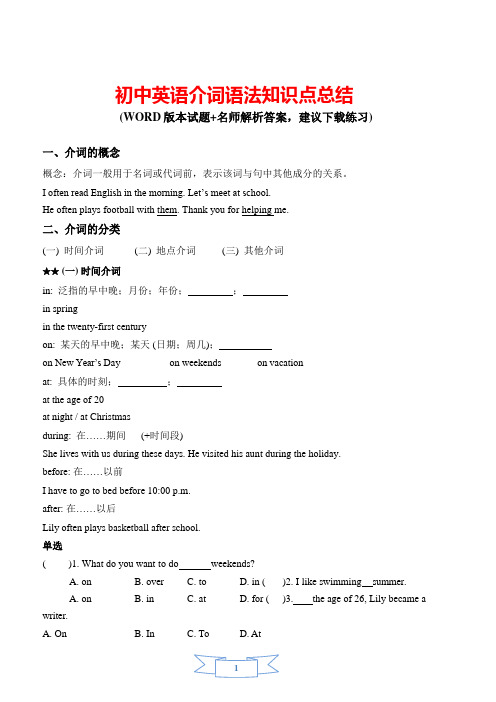
初中英语介词语法知识点总结(WORD版本试题+名师解析答案,建议下载练习)一、介词的概念概念:介词一般用于名词或代词前,表示该词与句中其他成分的关系。
I often read English in the morning. Let’s meet at school.He often plays football with them. Thank you for helping me.二、介词的分类(一) 时间介词(二) 地点介词(三) 其他介词★★ (一) 时间介词in: 泛指的早中晚;月份;年份;;in springin the twenty-first centuryon: 某天的早中晚;某天 (日期;周几);on New Year’s Day on weekends on vacationat: 具体的时刻;;at the age of 20at night / at Christmasduring: 在……期间(+时间段)She lives with us during these days. He visited his aunt during the holiday.before: 在……以前I have to go to bed before 10:00 p.m.after: 在……以后Lily often plays basketball after school.单选( )1. What do you want to do weekends?A. onB. overC. toD. in ( )2. I like swimming summer.A. onB. inC. atD. for ( )3. the age of 26, Lily became a writer.A. OnB. InC. ToD. At( )4. Jim learned to drive ___ the holiday.A. atB. duringC. toD. for( )5. He went to Shanghai July 7, 2013 and came backa cold morning last year.A. in; onB. on; inC. on; onD. in; in( )6. My mom often tells me to go back home dark(黄昏).A. afterB. toC. beforeD. for( )7. A lot of people are here _ vacation every year.A. ofB. onC. atD. with★★ (二) 地点介词1.地点介词 at, in, onat: “在……”(表一个点或小地方)at home at Mr. Cool’s Clothes Storeat the pool at Central Parkin: “在……里” (表一个范围或大地方) in China in Beijing in the water in the parkon: “在……上” (表一个表面,并接触) on the floor on the wall 对比这三个句子:They stood at the door and waited.他们站在门口等着。
中考常考的英语介词归类和练习
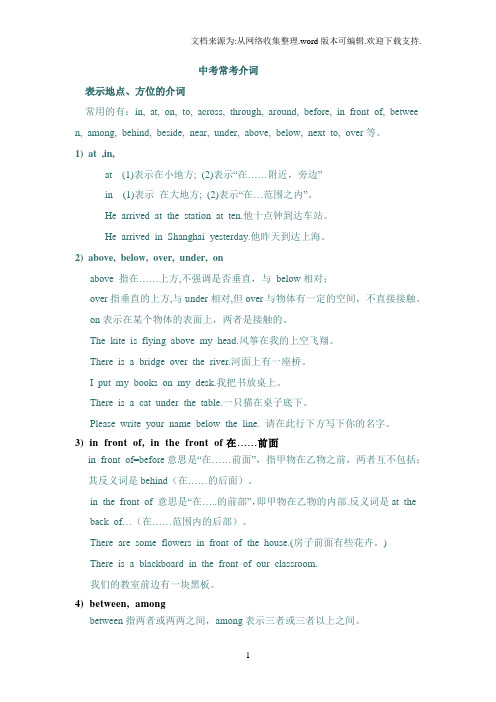
中考常考介词表示地点、方位的介词常用的有:in, at, on, to, across, through, around, before, in front of, betwee n, among, behind, beside, near, under, above, below, next to, over等。
1) at ,in,at (1)表示在小地方; (2)表示“在……附近,旁边”in (1)表示在大地方; (2)表示“在…范围之内”。
He arrived at the station at ten.他十点钟到达车站。
He arrived in Shanghai yesterday.他昨天到达上海。
2) above, below, over, under, onabove 指在……上方,不强调是否垂直,与below相对;over指垂直的上方,与under相对,但over与物体有一定的空间,不直接接触。
on表示在某个物体的表面上,两者是接触的。
The kite is flying above my head.风筝在我的上空飞翔。
There is a bridge over the river.河面上有一座桥。
I put my books on my desk.我把书放桌上。
There is a cat under the table.一只猫在桌子底下。
Please write your name below the line. 请在此行下方写下你的名字。
3) in front of, in the front of在……前面in front of=before意思是“在……前面”,指甲物在乙物之前,两者互不包括;其反义词是behind(在……的后面)。
in the front of 意思是“在…..的前部”,即甲物在乙物的内部.反义词是at the back of…(在……范围内的后部)。
初中英语语法基础——介词专题讲解 (附同步练习试题)
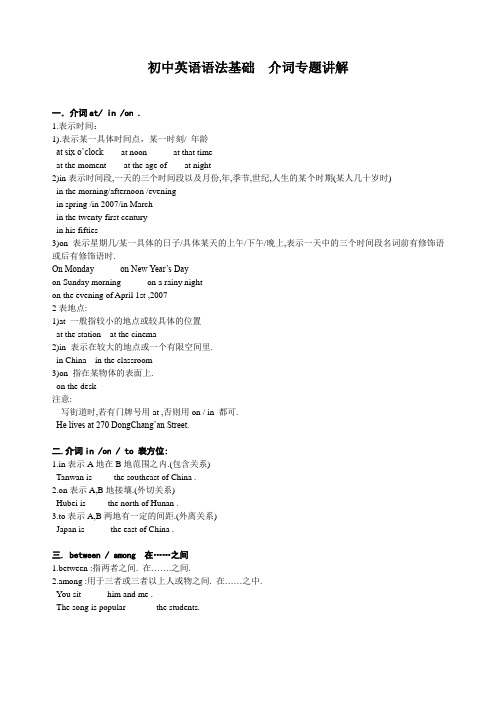
初中英语语法基础介词专题讲解一.介词at/ in /on .1.表示时间:1).表示某一具体时间点,某一时刻/ 年龄at six o’clock at noon at that timeat the moment at the age of at night2)in表示时间段,一天的三个时间段以及月份,年,季节,世纪,人生的某个时期(某人几十岁时)in the morning/afternoon /eveningin spring /in 2007/in Marchin the twenty-first centuryin his fifties3)on表示星期几/某一具体的日子/具体某天的上午/下午/晚上,表示一天中的三个时间段名词前有修饰语或后有修饰语时.On Monday on New Year’s Dayon Sunday morning on a rainy nighton the evening of April 1st ,20072表地点:1)at 一般指较小的地点或较具体的位置at the station at the cinema2)in 表示在较大的地点或一个有限空间里.in China in the classroom3)on 指在某物体的表面上.on the desk注意:写街道时,若有门牌号用at ,否则用on / in 都可.He lives at 270 DongChang’an Street.二.介词in /on / to 表方位:1.in表示A地在B地范围之内.(包含关系)Tanwan is ____ the southeast of China .2.on表示A,B地接壤.(外切关系)Hubei is ____ the north of Hunan .3.to表示A,B两地有一定的间距.(外离关系)Japan is _____ the east of China .三. between / among 在……之间1.between :指两者之间. 在…….之间.2.among :用于三者或三者以上人或物之间. 在……之中.You sit _____ him and me .The song is popular ______ the students.四.after / in 在……之后 before / in 在……之前1. after1)after + 时间段. 表示以过去某一时刻为起点的一段时间之后, 用于过去时.2)after 作介词. after doing sth.2.in +一段时间. 表示说话时或以现在为起点的将来一段时间之后.用于将来时.He came back ______ two days .He will go home___finishing his homework .He will come back _____ two days .3. before 多用于时间点或一件事之前发生,即“先于……;在……之前”He left the office bofore I got there. I’ll be back before five o’clock.4. ago 时间段+ ago 表示“多久之前”时态通常用:一般过去时I met Tom two days ago.五.with / in / by 表示“用……”1.with 表示“用…” 一般指有形的工具/ 手段/ 人体器官.He cut the apple into halves ____ a knife .注: with 表伴随, “带有,含有”He came in _____ a big smile on his face .2.in表示用某种语言,方式,途径. 或书写/绘画所用的材料. 也可表交通方式.Can you say it _____English ?He wrote a letter ____ blue ink .3.by表示乘坐交通工具, 表示方式,方法I study for a test _____ working with a group .He makes a living ____ selling newspapers .注意: 同义词组1).by phone = on the phone2).by car = in a car3).in pen = with a pen = with pens六.across / through / over / by 经过1.across 指横穿,穿过. 表示动作从某一物体表面上经过.2.through 指穿过,透过,表示从某一物体空间内通过.3.over 表示从某人或某物的上空经过或越过,不与表面接触.4.by 表示从某人/某物的旁边经过.Can you swim ______ the river ?the elephant is so big that it can’t go _____ the gate .I don’t think anyone can jump ___ the fenc e.I walked _____ the bank of China yesterday .七.in front of / in the front of1.in the front of 表示在…….内部的前面2.in front of 表示在……外面的前面There is a desk in _____ front of our classroom .There is a big tree in _____ front of our classroom.八.其它介词的用法:1.at的其它用法.1).表示“从事或正在做某事”,其后加的名词往往不加冠词.She is at work now = She is working now .2)at表示“价格或速度”The train ran at 120 kilometers an hour .2.in的其它用法:1)in表示“在……方面”词组:do well in = be good atbe weak in2)in 表示“穿着”后接表颜色的词或衣服.词组: be in +衣服= be wearing +衣服3)in作副词, “在家” = at home3.like 的用法:1).像/和……一样. 常与系动词连用.词组: look like sound like2).与what 连用, “是什么样子, 怎样”.What is he like ? He is kind .4.off的用法:1).从……下来, 脱离某物体.词组: fall off2). “休假”通常放在时间名词之后.词组: have +时间+ offHe has n’t had a night off for two hours .5.except / besides1).except 除了…….之外, 都……. . 不包括在范围之内.注: nothing but … 除了……之外,什么也没有.2).besides除了……之外,还有…… . 包括在范围之内.We all went swimming ______ Lucy .There is _______ a letter in the box .We study Japanese and French____ English .6.with / without1).with具有,含有反义词: without 没有词组: with the help of = with one’s help =because of = thanks towithout one’s help2).without 的用法:A).without + sb./ sth. 没有某人或某物B).without + doing sth . He lef t here without____(say ) “Goodbye”to usC). without sth 常与if 引导的否定的条件句.If there is no water , we can’t live .= We can’t live ______ _______ .7.on the tree /in the treeon the tree 表示“树上本身长的东西” 在树上.in the tree 表示“外界的物体进入树中” 人或物在树上.There are some apples _____ the tree .There is a boy ____ the tree.8.表示“数量的介词”about , round around , over1). about , round around表示“大约……”2).over 表示“超过”= more than.9.inside / outsideInside 在……里面------反义词:outside在….外面10.in the wall /on the wallin the wall 表示“门窗在墙上” on the wall 表示“某东西张贴或挂在墙上”九.不用介词的情况:1).当时间状语为: tonight, today, yesterday, tomorrow 等时,不用介词. What are you going to do tonight ?2).含有this, that, these, those, last, next, every/each day等时间状语.He went to Wuhan last week . I drink milk every day.3).以all 开头的时间状语前面不用介词.He has worked all day .4).以some ,any, one 等构成的时间状语前不用介词.He met a bad man one cold morning. = He met a bad man on a cold morning.介词专题小测:一、单项选择题。
英语语法介词in,on,at及其练习附答案
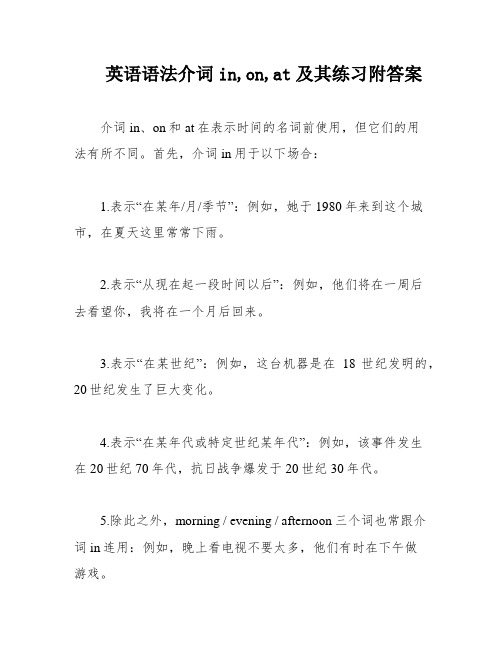
英语语法介词in,on,at及其练习附答案介词in、on和at在表示时间的名词前使用,但它们的用法有所不同。
首先,介词in用于以下场合:1.表示“在某年/月/季节”:例如,她于1980年来到这个城市,在夏天这里常常下雨。
2.表示“从现在起一段时间以后”:例如,他们将在一周后去看望你,我将在一个月后回来。
3.表示“在某世纪”:例如,这台机器是在18世纪发明的,20世纪发生了巨大变化。
4.表示“在某年代或特定世纪某年代”:例如,该事件发生在20世纪70年代,抗日战争爆发于20世纪30年代。
5.除此之外,morning / evening / afternoon三个词也常跟介词in连用:例如,晚上看电视不要太多,他们有时在下午做游戏。
其次,介词on用于以下场合:1.表示“在具体的某一天”或“(在具体的某一天的)早上、中午、晚上”等:例如,杰克生于1982年5月10日,他们是在一个雨天的早上离开的。
He returned to the United States one summer afternoon。
To indicate a specific day of the week or time of day。
the n "on" is used。
For example: We do not attend school on Saturdays and Sundays。
What time do you wake up on weekdays。
I heard this story on Saturday morning。
To indicate a specific holiday。
the n "on" is used。
For example: We usually eat mooncakes on theMid-Autumn Festival。
Mr。
Hu received a card on Teachers' Day.To indicate a specific time of day (i.e。
小升初英语介词知识详解及习题(含答案)

介词(基础篇)1考点一:方位介词方位介词是表示位置和方向的介词.常用的方位介词有on,over,above,under, below,in,at,about,around,behind,between,among,beside,near等.1.on,over和above的用法on,over和above都有“在…上面”的意思,但这三个调在意义上还是有一些区别的。
(1)on表示两个物体的表面相互接触,例如:There is a plant on the desk.书桌上有一株植物。
(植物紧贴着桌面)(2)over表示“在…的正上方”,两个物体表面没有接触,侧如:A lamp hung over the table.桌子上方挂着一盏灯。
(灯和桌面没有接触)(3)above表示一个物体在另一个的上方,但不一定是在正上方,两个物体之间没有接触。
例如:Look!A lot of birds are flying above the trees.看!许多鸟正在树的上空飞。
2.under和below的用法under和below都有“在…下面”的意思,不过这两个词也是有区别的.(1)under表示“在…的正下方”。
例如:There is a cat under the table.桌子下面有一只猫。
(2)below表示"在…的下面",但不强测是否在正下方,例如:Our classroom is below theirs.我们的教室在他们(教室)的下面。
介词(基础篇)2 3.in的用法in表示"在…里面",也可以用来表示在一个很大的空间内。
例如:There are some books in the box箱子里有一些书。
4.at,about和around的用法at表示"在…旁边",about或around表示"在…周围"。
(1)at表示在某物旁边。
(完整)初中英语介词用法详解与练习.
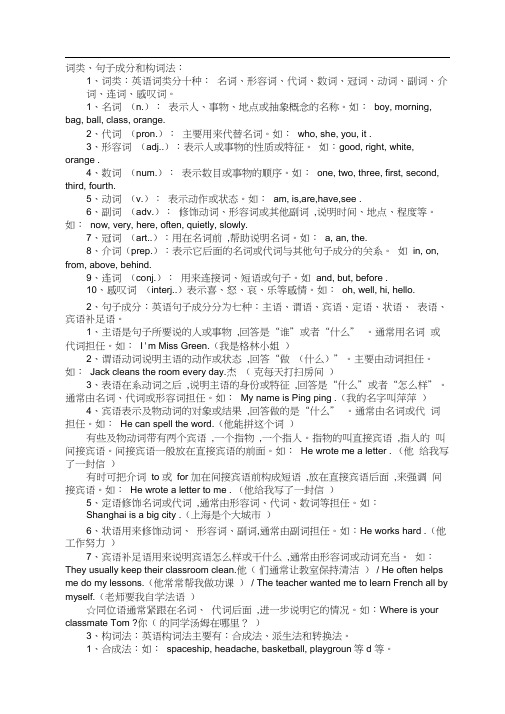
词类、句子成分和构词法:1、词类:英语词类分十种:名词、形容词、代词、数词、冠词、动词、副词、介词、连词、感叹词。
1、名词(n.):表示人、事物、地点或抽象概念的名称。
如:boy, morning, bag, ball, class, orange.2、代词(pron.):主要用来代替名词。
如:who, she, you, it .3、形容词(adj..):表示人或事物的性质或特征。
如:good, right, white, orange .4、数词(num.):表示数目或事物的顺序。
如:one, two, three, first, second, third, fourth.5、动词(v.):表示动作或状态。
如:am, is,are,have,see .6、副词(adv.):修饰动词、形容词或其他副词,说明时间、地点、程度等。
如:now, very, here, often, quietly, slowly.7、冠词(art..):用在名词前,帮助说明名词。
如:a, an, the.8、介词(prep.):表示它后面的名词或代词与其他句子成分的关系。
如in, on, from, above, behind.9、连词(conj.):用来连接词、短语或句子。
如and, but, before .10、感叹词(interj..)表示喜、怒、哀、乐等感情。
如:oh, well, hi, hello.2、句子成分:英语句子成分分为七种:主语、谓语、宾语、定语、状语、表语、宾语补足语。
1、主语是句子所要说的人或事物,回答是“谁”或者“什么” 。
通常用名词或代词担任。
如:I'm Miss Green.(我是格林小姐)2、谓语动词说明主语的动作或状态,回答“做(什么)”。
主要由动词担任。
如:Jack cleans the room every day.杰(克每天打扫房间)3、表语在系动词之后,说明主语的身份或特征,回答是“什么”或者“怎么样”。
(完整版)介词的用法及习题
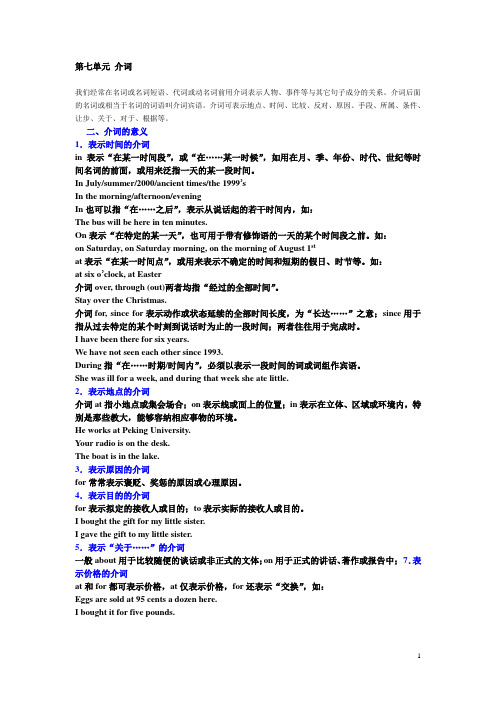
第七单元介词我们经常在名词或名词短语、代词或动名词前用介词表示人物、事件等与其它句子成分的关系。
介词后面的名词或相当于名词的词语叫介词宾语。
介词可表示地点、时间、比较、反对、原因、手段、所属、条件、让步、关于、对于、根据等。
二、介词的意义1.表示时间的介词in表示“在某一时间段”,或“在……某一时候”,如用在月、季、年份、时代、世纪等时间名词的前面,或用来泛指一天的某一段时间。
In July/summer/2000/ancient times/the 1999’sIn the morning/afternoon/eveningIn也可以指“在……之后”,表示从说话起的若干时间内,如:The bus will be here in ten minutes.On表示“在特定的某一天”,也可用于带有修饰语的一天的某个时间段之前。
如:on Saturday, on Saturday morning, on the morning of August 1stat表示“在某一时间点”,或用来表示不确定的时间和短期的假日、时节等。
如:at six o’clock, at Easter介词over, through (out)两者均指“经过的全部时间”。
Stay over the Christmas.介词for, since for表示动作或状态延续的全部时间长度,为“长达……”之意;since用于指从过去特定的某个时刻到说话时为止的一段时间;两者往往用于完成时。
I have been there for six years.We have not seen each other since 1993.During指“在……时期/时间内”,必须以表示一段时间的词或词组作宾语。
She was ill for a week, and during that week she ate little.2.表示地点的介词介词at指小地点或集会场合;on表示线或面上的位置;in表示在立体、区域或环境内,特别是那些教大,能够容纳相应事物的环境。
- 1、下载文档前请自行甄别文档内容的完整性,平台不提供额外的编辑、内容补充、找答案等附加服务。
- 2、"仅部分预览"的文档,不可在线预览部分如存在完整性等问题,可反馈申请退款(可完整预览的文档不适用该条件!)。
- 3、如文档侵犯您的权益,请联系客服反馈,我们会尽快为您处理(人工客服工作时间:9:00-18:30)。
英语介词用法归类(配练习)一、表示方位的介词in, to, on1. in 表示在某地范围之内。
Shanghai is/lies in the east of China.上海在中国的东部。
2. to 表示在某地范围之外。
Japan is/lies to the east of China.日本位于中国的东面。
3. on 表示与某地相邻或接壤。
Mongolia is/lies on the north of China.蒙古国位于中国北边。
二、表示计量的介词at, for, by1. at表示“以……速度”“以……价格”。
It flies at about 900 kilometers an hour.它以每小时900公里的速度飞行。
I sold my car at a high price.我以高价出售了我的汽车。
2. for表示“用……交换,以……为代价”。
He sold his car for 500 dollars.他以五百元把车卖了。
注意:at表示单价(price) ,for表示总钱数。
3. by表示“以……计”,后跟度量单位。
They paid him by the month.他们按月给他计酬。
Here eggs are sold by weight.在这里鸡蛋是按重量卖的。
三、表示材料的介词of, from, in1. of成品仍可看出原料。
This box is made of paper.这个盒子是纸做的。
2. from成品已看不出原料。
Wine is made from grapes.葡萄酒是葡萄酿成的。
3. in表示用某种材料或语言。
Please fill in the form in pencil first.请先用铅笔填写这个表格。
They talk in English.他们用英语交谈。
四、表示工具或手段的介词:by, with, on1. by用某种方式,多用于交通。
I went there by bus.我坐公共汽车去那儿。
2. with表示“用某种工具”。
He broke the window with a stone.他用石头把玻璃砸坏了。
注意:with表示用某种工具时,必须用冠词或物主代词。
3. on表示“以……方式”,多用于固定词组。
They talked on the telephone.他们通过电话进行交谈。
She learns English on the radio/on TV.她通过收音机/电视学英语。
五、表示关于的介词of, about, on1. f仅是提到或谈到过某人或某事。
He spoke of the film the other day.他前几天提到了这部影片。
2. about指“关于”某人或某事物的较详细的情况。
Can you tell me something about yourself?你能告诉我关于你自己的事情吗?3. on指“关于”学术性的或严肃的事。
It’s a textbook on the history of china.它是一本有关中国历史的教科书。
六、表原因或理由的介词for, at, from, of, with, by, because of1. for表示原因,与sorry, famous, punish, praise, thank, blame连用。
I am sorry for what I said to you.我后悔不该对你讲那些话。
2. at指情感变化的原因,意为“因听到或看到而……”。
He was surprised at the news.听到这消息他大吃一惊。
3. from指“外在的原因”,如受伤、车祸等。
He died from the wound.他因受伤而致死。
4. of指“内在的原因”,如病、饿等。
The old man died of hunger.老人死于饥饿。
5. with指生理上或情感上的由外界到内心的原因。
Hearing the news, he jumped with joy.他们听到这个消息,欣喜若狂。
He was shaking with anger.他气得浑身发抖。
6. by表示外部的,尤其是暴力的或无意中造成某种结果的原因。
Her body was bent by age.他因年老背弯了。
She took your umbrella by mistake.我因弄错拿了你的雨伞。
7. because of 表示引起结果的直接原因。
He retired last month because of illness/because he ill.8. owing to多表示引起某不良后果的原因。
Owing to the rain they could not come.由于下雨他们没来。
9. thanks to表示引起某种幸运结果的原因,常译为“幸亏……,多亏……”。
Thanks to John, we won the game.多亏约翰,我们才赢了这场比赛。
10. out of表示动机的起因,常译为“出于……”。
He asked the question out of curiosity.他出于好奇才问了那个问题。
11. through多表示因局部而影响全局的原因。
The war was lost through bad organization.战争因组织不周而失败了。
七、表示好像或当作的介词:like, as1. like表示“像……一样”,其实不是。
Peter the Great, like his country, was strong and proud.彼得大帝像他的国家一样强健和自豪。
2. as表示“作为,以……身份”,其实也是。
He talked to me as a father.他以父亲的身份跟我谈话。
注:as作连词时,可表示“好像……”。
The work is not so difficult as you imagine.这工作不像你想像的那么困难。
八、表示支持或反对的介词:against, foragainst反对,for支持,互为反义词。
Are you for my idea or against it?你赞同还是反对我的想法?九、表示除某人某物外的介词:besides, excep1. besides是包括后面所提人或物在内的“除……外,还”。
Thirty students went to the cinema besides him.除他以外,还有30个学生去看了电影(共计31人去)。
He is interested in tennis besides(=as well as)football.他对足球和网球都感兴趣。
2. except是指不包括后面所提人或物在内的“除去”。
Everyone is excited except me.除我以外的每个人都很激动(我并不激动)。
All the visitors are Japanese except him.除他以外的所有游客都是日本人。
(他不是日本人)注意:(A) except通常与表示全体的all, every连用;若与other 连用,只能用besides。
He had other people to take care of besides me.除我之外,他还要照顾别人。
(B) except是排除同类;而except for是排除非同类,常在说明基本情况后,从细节上加上修正。
The composition is very good except for a few spelling mistakes.除了几处拼写错误之外,这篇作文整体还是不错的。
(作文与拼写错误是非同类的)但except for 有时也可代替except,特别是在句首时,因为except 是不能用于句首的。
Except for George, you can all go. 除乔治外,你们都可以去。
试试身手用适当介词填空:1. The teacher is writing ____ a piece of chalk on the blackboard while the students are writing ____ink in exercise books.2. The worker can make chairs ____ wood, and also can make paper ____ wood.3. Mary dropped in ____ Mr Smith, but he wasn' t at home, so she went to drop in ____ Mr Smith's office.4. The teacher is not only strict ____ his pupils but also strict ____ hisown work.5. He took a cup of tea, and went on______ the story。
6. If you run ____ two hares you will catch neither.7. This is a common mistake ____ students.8. My father began to work ____ a bus driver when he was twenty years old.9. _____ hearing the news, I was wild ____ joy.10.I don' t think Xiao Li is ____ the other students ____ mathematics.11. The window is never opened ____ in summer.12. We go to school ____ a bike.13. It's very kind____ you to repair the bike ____ me.14. Fresh air is good ____ your health.15.The boy is waiting ____ his sister and they will go to the hospital to wait ____ their sick mother.16.The group is made up____five students. And they are studying hard to make up____ the lost time.17.The PLA man saved the boy ____ death.18. He will come ____ three days.19. He went to Beijing and returned ____ three days.20. He will return____ three o'clock.21.I agree ____ what you said.22. Finally they agreed ____ the terms of the contract.23. Do you often hear____ your brother?24.1 heard ____ the book long ago, but I have never read it.25. The plane flew ____ the city.26. We walked ____ the Tian An Men Square to the Museum of Chinese History.27.I was wandering ____ the streets when I caught sight of a tailor's shop.28. ____ the sun, nothing would grow.29. We left Xi' an ___ a very hot summer afternoon.30. She felt disappointed when she found out they had gone swimming____ her.31. His teacher was angry ____ him ____ his being late.32. My father was disappointed ____ the news.33. Mr Wang went to Nanjing ___October,1998 and came back home ____the morning of Nov. 5.34 .My uncle lives ____ 105 Huanghe Street. His room is ____ the fifth floor.35. I don't think you can work out the maths problem ____ the teacher's help.36. He is running ___the wind towards the east of the station .37. In Hangzhou Mr Green was so struck ___the beauty of nature that he stayed ___another night.38. Many people are still ____ the habit of writing silly things ____public places.39. I made the coat ____ my own hands. It was made ____ hand, not witha machine.40. The trees ____ front of the house are ____ the charge of Old Li.41. The old man died ____ cold ____ a cold night.42. Does John know any other foreign languages ____ French?43.To tell you the truth, I have nothing to do ____ it.44. Something must be done to prevent our city ____ being polluted by thick smoke.45. Henry, together ____ Mary and Tom, is coming to China for a visit.46. Taiwan is ____ the east of Fujian.47. His father will be back from London ____ a few days.48. We offered him our congratulations ____ his passing the college entrance exams.49 .The word "write" has the same pronunciation ____ the word "right".50. The train leaves ____ 6: 00 p. m. So I have to be at the station ____ 5:40 p. m. at the latest.51. Go ____ the gate and you' 11 find the entrance ____ the park ____ the other side.52. One ____ five will have the chance to join in the game.53. Because of her devotion _____ music, she has become friendly with Mr. Zhang.54. What idea can a man who is blind from birth have_____ color?55. Some people say that we live _____ the age of computers.56. I saw Jack yesterday. He told me that he would stay here _____ the end of this year.57. _____most students, she was always well prepared and never came to class late.58. Let's walk over ___the shop on the other side of the street.59. The number of the employees has grown from 1,000 to 1,200. This means it has risen ____20 percent.60. ____production up by 60%, the company has had another excellent year.61. I know nothing about the young lady ___ that she is from Beijing.62.---You are so lucky.---What do you mean ____that?63.There were a lot of people standing at the door and the small girl couldn’t get _____.64. --- When do we need to pay the balance?--- __________ September 30.65.More and more young people are fond ___ playing tennis nowadays.66.People have always been curious ____ how living things on the earth exactly began.67.---Can he take charge of the computer company?---I'm afraid it's ________ his ability.68.After the earthquake,the injured were cared _________ in the hospitals or taken by air to the hospitals in the neighbouring cities.69.This new model of car is so expensive that it is _______ the reach of those with average income.70.It’s quite ____ me why such things have been allowed to happen.参考答案:1.with, in2.of, from3. on. at4. with, in5. with6. after7.among8. as9. On, with10.behind, in11. except12.on 13. of,for14.for 15.for,on 16.of,for17.from 18.in 19. after 20. at 21.with 22.on 23. from 24.of 25. over 26.across 27. through28. Without 29. on 30. without 31.with,for 32. at33. in;on34 .at;on 35. without36.against 37. by;for 38. in;in39. with; by40. in; in41. of;on42. besides43.with44. from 45. with46. to47.in48. on49 .as50. at;by51. through; to; on 52. in53. to 54. of 55. in 56. Till/until 57. Like 58. to 59. by 60. With 61. except 62.by 63. through64. By65. of 66. about67. beyond 68.for 69. beyond 70.beyond。
